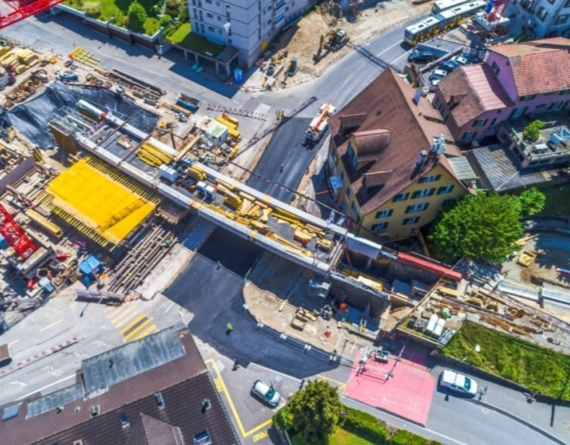Construction
- Home
- Construction
Construction
Challenges of Construction Industry of Ukraine
The construction industry faces challenges with the underutilization of strategies to enhance energy efficiency, alongside the issue of buildings consuming energy at high rates. This reliance on substantial amounts of non-renewable energy contributes to environmental degradation and a rise in detrimental emissions. Additionally, the sector’s inefficient management of raw materials and related construction products, which are seldom recycled, leads to the production of excessive waste, amounting to 25%–30% of materials used. Inefficient use of raw materials and associated products for construction, which currently have almost no reuse, resulting in high waste generation rates (up to 25%–30%).

Low level of digitalization:
- Developing low-quality project documentation leads to revisions, increasing both the estimated cost of construction projects and the project timelines.
- The process of developing project documentation, approving construction projects, and conducting their expertise is resource-intensive.
- Management inefficiencies in design, construction, and operational processes, exacerbated by inadequate communication between involved parties.
- A deficiency in adopting new technological methods to enhance resource utilization, cost reduction, and construction timelines.
The construction industry faces challenges due to the shortage of skilled labor and the generally low educational level of workers, which are critical issues that need to be addressed in future reconstruction planning efforts.

Technologies to Foster Recovery
Incorporate the reconstruction of housing into a broader city planning strategy that addresses affordability and inclusivity, enhances mobility, optimizes energy generation, and includes the reconstruction or repositioning of industrial sites within urban areas.
Adopting Building Information Modeling (BIM) brings about significant advantages throughout the construction sector:
- Improve collaboration by providing a shared, digital project model
- Enhance visualization – detailed visualization of the project before construction begins
- Errors and changes reduction
- Increased Efficiency -reducing the time and cost associated with project delivery
- Corruption prevention
Leverage of digital tools and platforms to enable a wide array of stakeholders – ranging from operations staff, financial analysts, safety managers, property owners, architects, collaborating contractors, inspectors, to investors – to have remote access to construction projects. Which allows them to review and understand the project’s current status and historical development from a comprehensive 360° perspective and manage the resources, costs.

Solutions for Ukraine
- Placing a strong focus on the incorporation of natural and renewable materials in construction projects to minimize environmental impact and enhance sustainability.
- Striving for a complete transition to sustainable electricity by harnessing on-site renewable energy generation capabilities alongside the acquisition of green energy sources.
- Leveraging the existing local district heating systems to supply heat efficiently, reducing reliance on non-renewable energy sources.
- Committing to the enhancement of local biodiversity and the reduction of urban heat islands through the strategic development of green spaces, including both vertical gardens and horizontal landscaping, as well as the implementation of tree-lined pathways to facilitate natural cooling and improve air quality.
BIM Certification
The EU and several countries have strengthened regulations, making the use of Building Information Modeling (BIM) compulsory for construction activities. Ukraine endorsed this technology in 2021, setting a directive that by 2035, every professional involved in construction is required to be BIM certified.
On governmental level country’s embrace of BIM can lead to global standardization, foster better international cooperation, minimize risks, and boost the construction sector’s competitiveness, all of which collectively support the creation of more efficient and sustainable infrastructure projects. It will also helps to reduce the level of corruption, which leads to increase investments into the field.
Constructions sphere professionals, architects, designers, all the experts, engaged into construction projects. Students of technical universities Construction project manages Successfully clearing the BIM certification exam showcases proficiency and opens doors to career progression, opportunities to engage in global projects, and the potential for collaboration with Swiss companies.
Constructions sphere professionals, architects, designers, all the experts, engaged into construction projects.
Students of technical universities.
Construction project managers by successfully clearing the BIM certification exam showcases proficiency and opens doors to career progression, opportunities to engage in global projects, and the potential for collaboration with Swiss firms.
Digitalization
Ukrainian big construction companies, which would like to attract investors by adopting a clear documentation and efficient processes within their projects. Companies and individuals specializing in the repair of damaged or destroyed homes gain advantages from employing 3D scanning and other cutting-edge technologies. These tools not only enhance safety by reducing the risk of injuries but also identify the most effective strategies for reconstruction.
Best Practices




